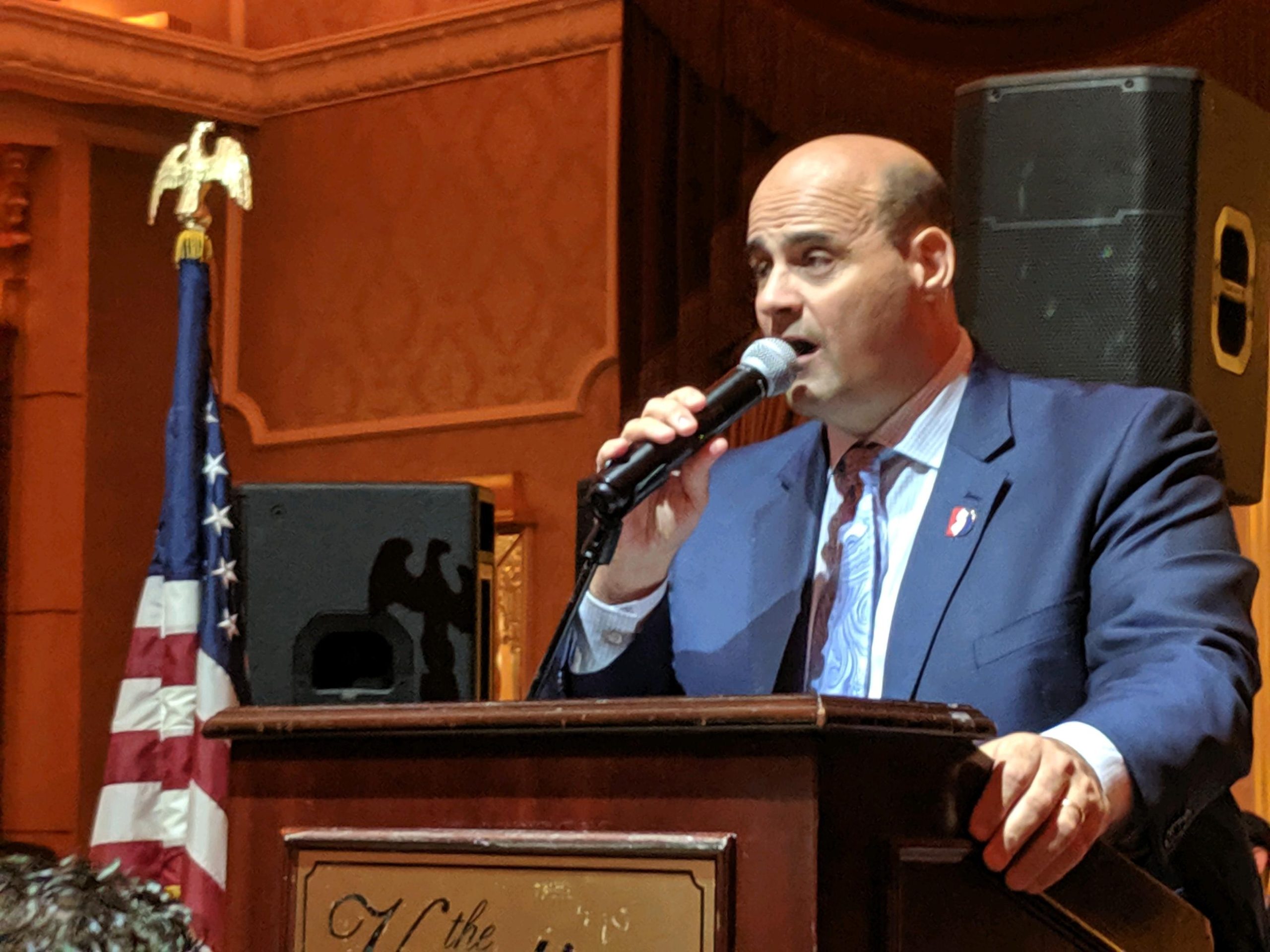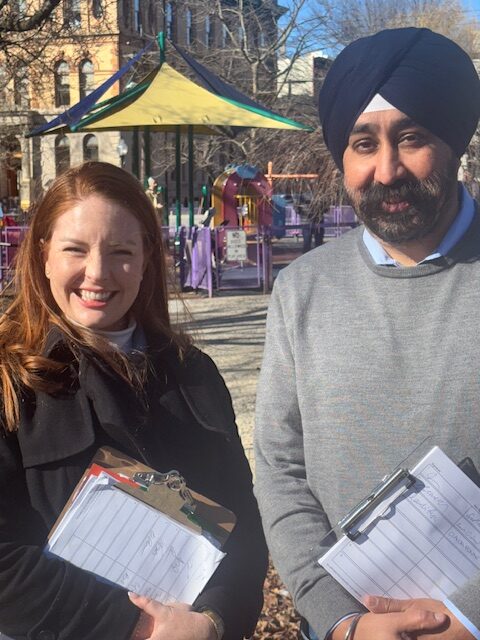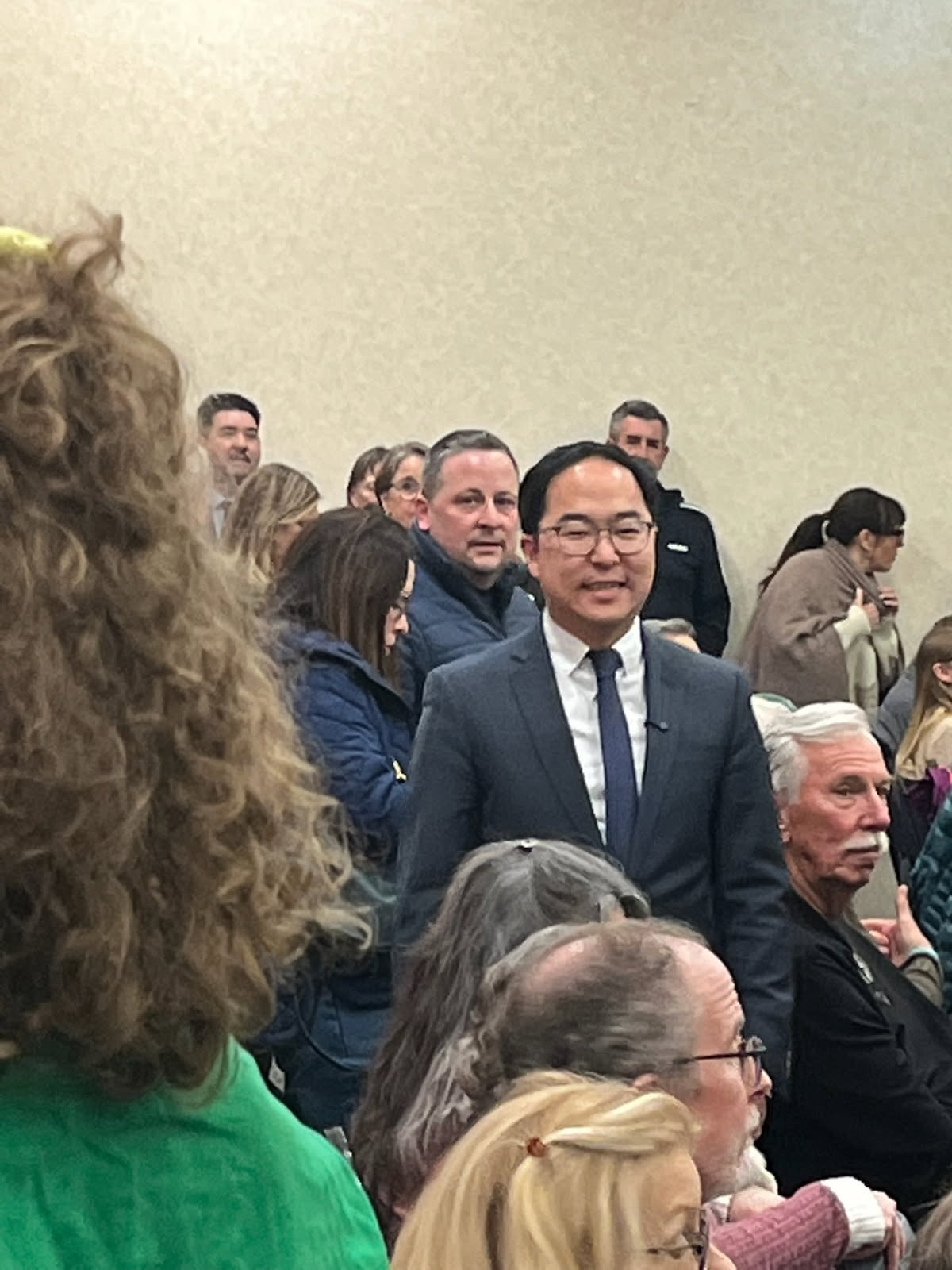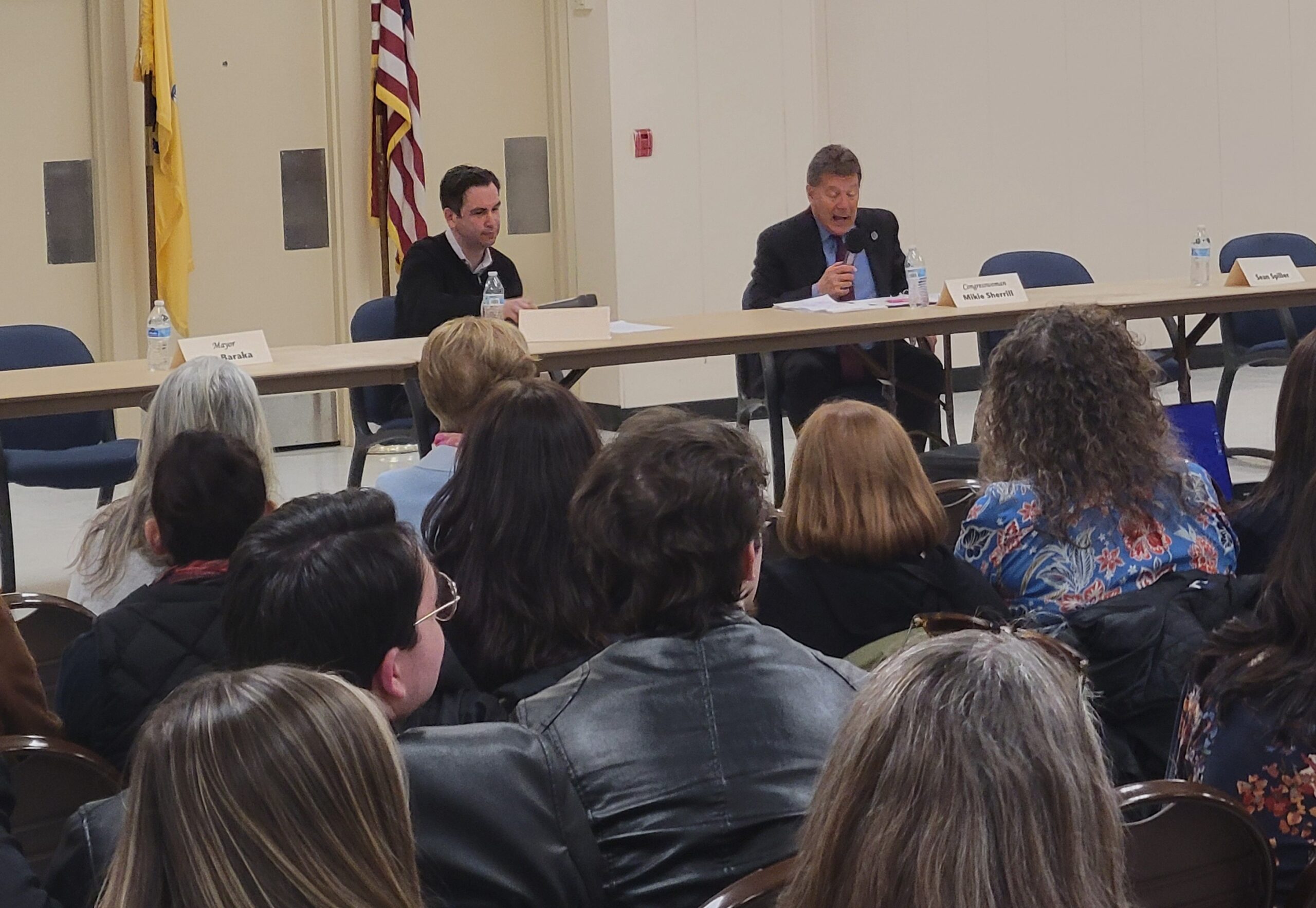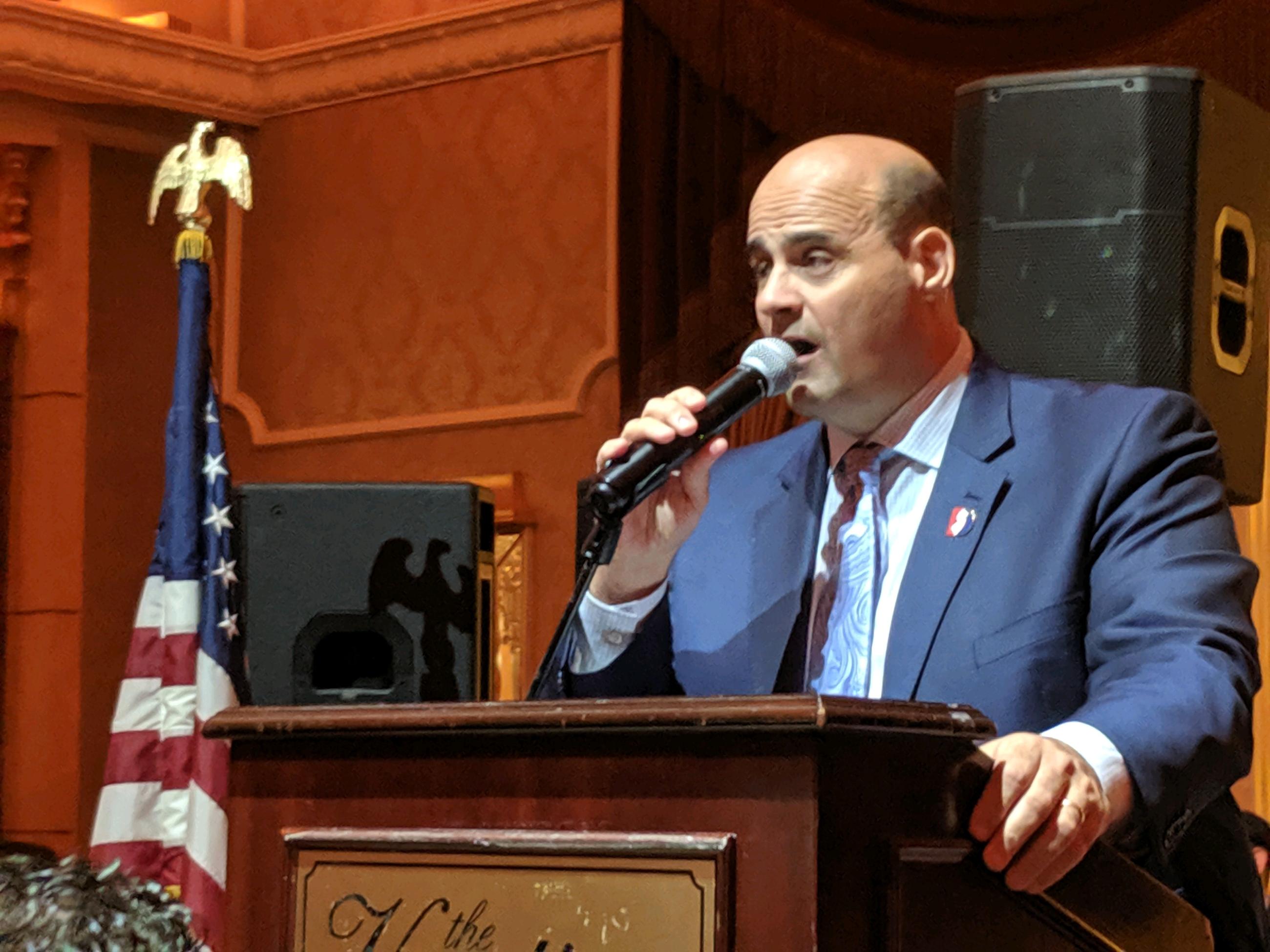
If God crammed the universe into 247 square miles, it might look a little like Bergen County, New Jersey. Maybe that’s why the Murphy and Kim campaigns see the place as particularly important – and emblematic – as they tussle for the Democratic nomination to succeed what remains of U.S. Senator Bob Menendez.
Those who might gripe that Bergen fails to embody an urban ethos and therefore comes up short in representing anything resembling a totality, might see it possessing so much of everything that it finally it inhabits something close to nothing.
But Kim and Murphy don’t see it that way.
Not now.
To them, the sprawling suburban slice of planet earth, complete with populations ethically and ideologically front-lined on the Middle East catastrophe, living backyard to backyard, firehouse collaborative to firehouse collaborative, might as well be the political equivalent of D-Day.
If Murphy loses Monday night’s convention, slated to take place at an IBEW Hall in Paramus, the loss will likely finish her candidacy, or at least ratchet up the ante on remaining county chairs in the unfolding season to the point of utter exhaustion – and maybe despair.
It wasn’t supposed to be this way.
Sources say Bergen County Democratic Committee Chieftan Paul Juliano continued to feel mounting pressure this week as his establishment county committee allies seek to stop the appearance of considerable Murphy Campaign bleeding by dealing her a Bergen solid.
Of course, it wasn’t all one-way traffic.
Juliano also evidently contributed his own share of pressure to committee members.
Everyone’s jangled.
Speaking on condition of anonymity, a source close to the cauldrons of party power up there said she believes Murphy can prevail. But even if it’s 60-40% with Kim on the losing end (in a mammoth, secret ballot convention) after he slammed through Monmouth, Burlington, and Monmouth, it still looks just awful. A second source confirmed expectations of a similar kind of split, with Murphy winning, but no one could confirm the exact number of heads of hair that have turned white in the process.
Across the river, to westward, former Sheriff Jerry Speziale was said to be making battle preparations for an off-the-line countywide candidacy in Passaic (where Murphy prevailed – not by county committee secret ballot but by municipal chairs’ hand vote), while Kim conversed – points east – with Hoboken Mayor Ravi Bhalla (running against Menendez’s son, U.S. Rep. Rob Menendez, Jr. in CD-8) and appeared well on his way to establishing a Hudson footprint of rebellious consequence.
More than a handful of grumbly insiders read Kim’s decision to file for emergency injunctive relief in the U.S. District Court in the District of New Jersey to prohibit the use of county-line ballots statewide and “give all voters a fair and legitimate choice in the 2024 primary election through office-block ballots” as a white flag thrown up ahead of Bergen. “Convenient, isn’t it – that now – up against Bergen – Kim wants a prohibition on county-line ballots after he wins the line in three counties,” a source sneered.
Did the congressman know he was going to lose, or rather, that the rules of engagement as propagated by the party organization would not allow him a chance to win?
“New Jersey voters don’t want to be told who to vote for,” said Kim. “Jersey voters are tired of the broken politics that lets party leaders give their hand-picked candidates preferential placement on the ballot. This unfair process needs to end now. The people deserve a ballot like what every other state uses that is fair, democratic, and allows their voices to be the ones that determine who represents them.”
In addition, the most cynical of cynical players remarked on how progressive darling Kim continues to defy the same county organizations that would likewise deny former Senate President Steve Sweeney’s 2025 gubernatorial candidacy.
They read deeply into the following, from Jay Lassiter’s Saturday column:
After speeches, the delegates went to a vote and Senator Troy Singleton had this to say about the notorious ballot design (aka The Line) that almost always determines the outcome of NJ elections before the voters even enter the picture: “As much as I love my county committee members, we should have a process where the people will ultimately decide. We can still have a moniker next to any individual names to show that they are [the county committee’s] preferred candidate and I think that’s the direction we should go.”
Singleton’s no babe in the woods.
He was a rock-ribbed Sweeney ally when Sweeney served as senate prez.
Citing Kim as the 2024 cottontail blazing a trail for none other than the big bad wolf of South Jersey ’25 amounted to maybe the most bitter card the Murphy apologists could play as they tried to cling to their candidate’s chances. As much as they wanted to make that stick – “See what you’re doing, progressives, in your efforts to fight the machines, you’re actually rapidly re-empowering the most dominant party machine of the past two decades” – it fell apart, not only within the folk-rock star atmosphere generated by Kim. It smacked of boogeyman-summoning as a replacement for actually furnishing a ticket – and candidates – truly corresponding with the best ideals of the party, who inspire as opposed to decay or diminish, and make people want to work rather than merely complain about the other side. The Menendez meltdown and the Murphys’ power play to exploit organizations for the sake of their own extended runway just resonated too loudly with people, and it spoke volumes, regardless of who wins Monday, that even dominating party chairs with levers of power connected to homunculi piled up on the public payrolls, couldn’t say for sure how it would go down in a Paramus IBEW Hall. Indeed, the oscillating energy seemed more electromagnetic than simply suburban.
(Visited 1 times, 1 visits today)
In a recent legal battle that has captured the attention of many in New Jersey, Bergen County has taken center stage in the case of Kim v. Murphy. The lawsuit, filed by former gubernatorial candidate Hirsh Singh and Republican State Committee member Christian Onuoha, alleges that Governor Phil Murphy violated the state constitution by issuing executive orders during the COVID-19 pandemic.
The case specifically focuses on Executive Order 103, which declared a public health emergency in New Jersey and gave Governor Murphy broad powers to respond to the crisis. Singh and Onuoha argue that the order exceeded the governor’s authority and infringed on the separation of powers between the executive and legislative branches.
Bergen County Superior Court Judge Estela De La Cruz recently heard arguments from both sides in the case. The plaintiffs argued that Governor Murphy’s executive orders were unconstitutional and should be invalidated, while the state defended the orders as necessary measures to protect public health during a global pandemic.
The outcome of the case could have significant implications for the balance of power between the governor and the legislature in New Jersey. If the court rules in favor of Singh and Onuoha, it could limit the governor’s ability to issue executive orders without legislative approval in future emergencies.
The case has also sparked debate about the role of government in responding to public health crises and the limits of executive power. Supporters of Governor Murphy argue that he acted decisively to protect the health and safety of New Jersey residents during a time of unprecedented crisis, while critics contend that his actions were an overreach of authority.
As Bergen County continues to play a central role in the Kim v. Murphy case, all eyes will be on Judge De La Cruz as she considers the arguments and makes a decision that could have far-reaching consequences for the state. The outcome of this case will undoubtedly shape the future of emergency response and executive power in New Jersey for years to come.

